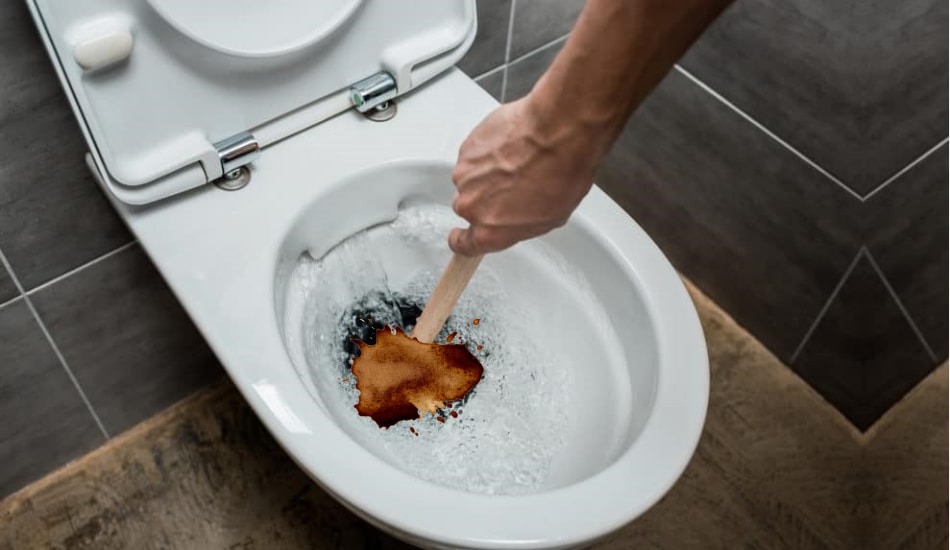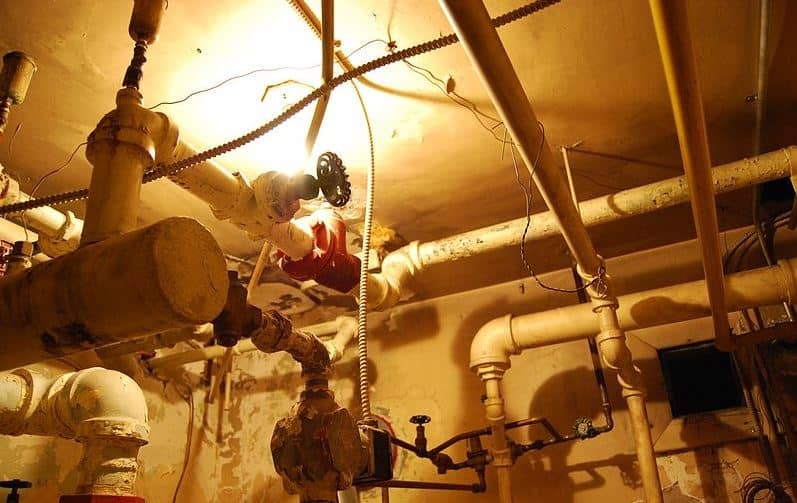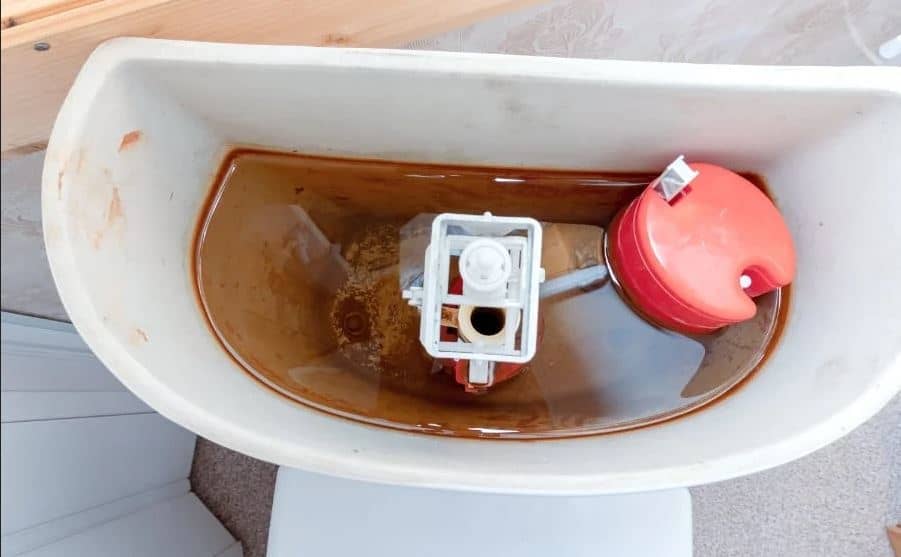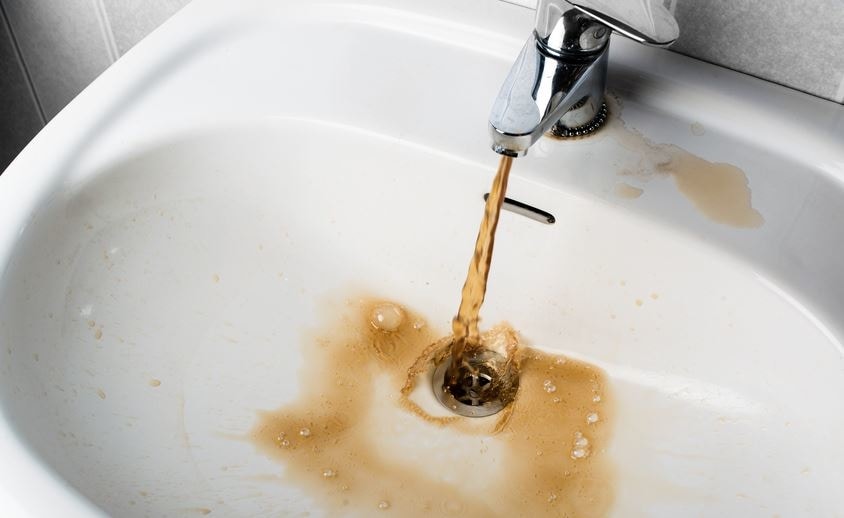What Causes Brown Water In Toilet? Plumber Explain

If you have noticed brown water in your toilet you must have been upset. The most common reason why this happens is because of the rust inside the system. Old galvanized pipes are prone to rust, and rust is the most common reason why water change color in toilet bowls.
In addition, sometimes, the water in your system could be rich in iron compounds. Rust alone cannot cause health problems, but it can cause ugly stains on your toilet and this can lead to the accumulation of bacteria. For that reason, we’ll talk about why toilets have brown water and how you can fix this. So, let’s start!
So What Causes Brown Water In Toilet? Brown water in your toilet is usually the cause of rusted pipes in the plumbing system. Using water softeners or chlorine can lower the iron content in toilet water and fix this issue. However, rusted toilet parts, hard water mineral buildup, or damaged parts can also cause brown water.
But before you try anything, flush your toilet. Sometimes the problem can be in too many residues that need to be flushed. And for that reason, brown water in your toilet bowl is present. If the water remains brown even after the flush, you can exclude feces as a reason. Then it’s time to look for another cause of the problem.
If you want to learn more about toilet problems, be sure to read How to Remove Yellow Stain In Toilet Bowl? Explained.
To know what exactly causes brown water in your toilet, first, check what is the color of the water that is coming out of all other water sources in the household. Check the water color in the tub, sinks, and all the other taps that you have in your house. This is the best way to discover the source of your problem. After reviewing all the water sources in the household, you will be left with only a few options. Here are the 6 most common reasons:
1. Everyday Use
As we mentioned earlier, before you try anything else, flush your toilet. It is always possible that there is too much residue left in the water from the last use. If the water remains brown even after the flush, the cause of the problem is more serious. So let’s move on.
2. Rusted Pipes
The next step is to check the water color in the rest of your home. Check all the faucets you use, kitchen sink, bathroom, etc. If the water coming out of all the taps in the household is brown, then the problem is related to the whole home plumbing system and not just the toilet.
The cause of brown water, in this case, is probably the higher presence of iron in the water. Keep in mind that the pipes installed in homes before 1960 were made of iron in most cases. Over time, iron rusts and pipes covered with rust deposits release this substance into the water, making it brown.
3. Damaged Well
Brown water in the toilet can be caused by having a well in your backyard. This can lead to the presence of some organic matter in the well that fails to dissolve. In such cases, you well may contain sediment. Something likely happened that damaged the well, like construction work nearby or a natural disaster. In this case, the problem should be solved by a professional.
4. Rusted Pipes In The Toilet
After checking all the water sources in your household, and it’s only brown water is in the toilet, then the problem is localized. In this case, there is a high possibility that the cause of the problem is rusted pipes. In some households, the toilet is connected to a separate water source, and there is a chance that one of the pipes leading to the toilet is rusty.
5. Mineral Build-Up Cause by Hard Water
For homes that have a new plumbing system and you are convinced that rust on the pipes cannot be the cause of brown water in the toilet, it is time to consider some other causes. The brown color in the toilet can be caused by a blockage somewhere in the sewer pipes system that is made from hard water minerals deposits. Such deposits consist of calcium and magnesium, which in contact with oxygen can cause them to turn brown.
6. A Clogged Pipe
Brown water in your toilet can also be the result of a clogged pipe somewhere inside the system. Due to clogging, various particles accumulate in the toilet. To solve this problem, you will probably need the help of a professional to fix this issue. You need to get rid of blockages in the sewer line as soon as possible because the pipes can suddenly burst due to strong pressure.
What If Brown Water Is In All Water Sources?

If, after checking all the water sources in your home, it turns out that brown water is present in all water sources, then this is because there is too much iron. However, there are some other indicators that can help you notice iron in the water before you check your draining system. You can check your clothes and see if there are dark stains on them. Also, if a larger amount of iron is present in the water, it can also taste like metal.
Pipes that were installed in homes before 1960 are made of iron, most often galvanized steel that corrodes easily and oxidizes in contact with water. These two phenomena cause rust on iron, which begins to dissolve and mix with water over time. This is why corroded iron pipes are the main reason why brown water can appear in a household.
Today, pipes for plumbing systems are made of PVC or similar materials that do not corrode. So, when it comes to newer homes, this will not be an issue.
There Is Brown Water In Toilet Only
After inspecting all water sources in your home, you notice that brown water is only present in the toilet, then the cause of your problem is probably corroded pipes. It is not uncommon for bathrooms to have a separate water supply system even though it comes from the same source.
Although the pipes inside the house’s plumbing system today are largely made of PVC material, the pipes to which the toilet is connected are sometimes made of galvanized steel. This is why brown water will not be in the tub but at the same time, will be present in the toilet. It may also be the case that the rust has affected only one pipe inside the system, just of the toilet.
If you notice sediment along with brown water, be sure to check the condition of the well. There is always the possibility that your pump filter has broken down (it has the role of preventing dirt from entering your plumbing system).
How to Get Rid of Brown Water in Toilet Tank?

No one likes to see brown water after flushing the toilet. But there are a few simple solutions to this problem. Before you call a plumber, consider installing a good water softening system. This way, you can get rid of brown water and deposits in the toilet without much trouble.
Water softening systems works by removing hard minerals and iron from water. Installing such a system is ideal if brown water has appeared on all your water sources. Keep in mind that a professional should install this system. The brown color will disappear once the system starts working, and the water will be safe to drink.
If you think the water softener system won’t solve your problem, you can still install a water purifier and filter. In any case, if you are considering a water softening system, you should first check how much of iron is present in the water within your household. If you want to know more about water purifiers, be sure to read How Much Power (Watts) Does a Water Purifier Use?
An iron test kit can be purchased at almost any hardware store, and this work can be done by a plumber instead of you. Of course, if you call a plumber, this will cost you a lot more, but in that case, you will get a much more detailed insight into the water composition.
Note! It should be noted that large amounts of iron in water are not easy to remove, even with the help of filters.
Can You Prevent Pipes From Corroding?
You don’t have to worry about corrosion if you have PVC pipes in your household plumbing system. However, if you have galvanized steel pipes, you have to be prepared that corrosion will occur someday. Good prevention, in this case, is to use water filters. But even they cannot guarantee that corrosion will not occur.
Your pipes will be in good condition if you take care of them regularly. When you maintain your plumbing system well, you reduce the possibility of brown water. But if you have galvanized steel pipes, corrosion can still occur despite regular maintenance.
Is Iron in Water Dangerous?

If it happens that you drank brown tap water from your tap, don’t worry. Although this is an unpleasant situation, nothing dangerous can happen to you since iron is an essential mineral of the human body, and it’s not toxic. But you must know that brown water in your plumbing system is caused by the same type of rust that forms on metal surfaces left to soak in the open for a long time.
However, if you regularly drink brown water for a long time, this can have consequences for your health, which will manifest itself as:
- Bad skin
- Iron overload
- Liver damage
- Heart and pancreas damage
You need to know that water that has too much iron will leave a metallic taste in your mouth even after you consume a fresh water. If you suddenly notice that the water you consume from your household has an unusual metallic taste, call a plumber to check the level of iron in the water.
Final Thoughts
If brown water suddenly appears in your toilet there is no reason to panic or feel disgusted. Most often, the brown water is not the result of debris after using the toilet and does not pose any danger. The most common cause of brown water in the toilet is rust that is released from galvanized pipes, which in turn are still an integral part of the plumbing system of many households.
Although the first time after the appearance of brown water there will be no negative consequences for your health or household, in the long run, it can happen that the presence of large amounts of iron causes damage. You certainly should not ignore the problem because you can endanger the entire plumbing system in your home. If the water coming out of your taps is also brown, you can endanger your health in the long run too.
